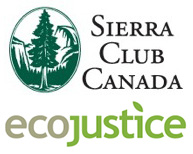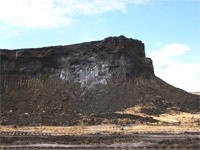
News |
- Sustainable Canadian Cities Ranked
- Corn Ethanol, More Costly
- Canada to Deregulate Environmental Assessment
- Manitoba Still Without Energy Plan
- Canadian Government Seeks Special Treatment
- Federal Review of Toxic Substances Delayed
- Japan's Whale Research Kills Hundreds
- Financial Support for Delayed Pipeline
- Federal Budget Short on Green Actions
- Canada Human Rights Record Faces Review
- Oilsands - A Moral Problem
- Letter Opposes Canada's "Dirty Oil"
| Sustainable Canadian Cities Ranked | 18 February 09 |
 Corporate Knights Magazine released their Most Sustainable Cities in Canada list with top ranking cities being Edmonton, Halifax and Yellowknife. Ranking is based on city practices that leave the smallest environmental footprint and promote healthy living. Corporate Knights Magazine released their Most Sustainable Cities in Canada list with top ranking cities being Edmonton, Halifax and Yellowknife. Ranking is based on city practices that leave the smallest environmental footprint and promote healthy living.First in the large city category, Edmonton wants to be an "innovation centre for value added and green technologies and products" and is measuring progress by percentage of green collar jobs. In the medium city category, Halifax has insecticide and pesticide bans throughout the city and has established a Sustainability Transition Team. In the small city category, Yellowknife has integrated energy efficiency into its building bylaws, conducted an energy audit on all of its facilities, and is the only small city with a LEED-certified building. Seventeen Canadian cities were assessed on newly expanded indicators to better represent results-oriented factors, such as improved air quality, domestic and overall water usage and the number of people employed in cultural industries. Corporate Knights found that overall Canadian cities are doing a good job of self-regulating. View Corporate Knights - 2009 Sustainable Cities ReportView January 29, 2009 Corporate Knights Magazine press release View February 2, 2009 Metro News article View February 5, 2009 Northern News Services article Sources: Environmental Communications Options, Metro News, Northern News Services |
|
 Print version Print version |
Top |
| Corn Ethanol, More Costly | 18 February 09 |
 A new University of Minnesota study adds to debate over the impact of corn-based ethanol. The study found corn ethanol, including the environmental effects of growing and harvesting, is no better than gasoline and may be worse for air quality. A new University of Minnesota study adds to debate over the impact of corn-based ethanol. The study found corn ethanol, including the environmental effects of growing and harvesting, is no better than gasoline and may be worse for air quality."Our work highlights the need to expand the biofuels debate beyond its current focus on climate change to include a wider range of effects such as their impacts on air quality," said Jason Hill, lead author of the report. Published in Proceedings of the National Academy of Sciences, the study examined combined environmental and human health costs of gasoline, corn-based ethanol and cellulosic fuels. It found corn ethanol to be the most costly. Cellulosic ethanol made from wood, grasses and plant biomass produces less emissions of fine particulate matter, emits lower levels of greenhouse gases and has fewer effects on human health. Although environmental and health costs of cellulosic ethanol are less than half that of corn-based biofuels, it is far from being ready for commercial use. View study, Climate Change and Health Costs of Air Emissions from Biofuels and Gasoline (PDF)View February 6, 2009 Green Biz article View February 9, 2009 Minnesota Daily article View February 5, 2009 New York Times Blog article View February 4, 2009 MSNBC article Sources: Proceedings of the National Academy of Sciences, Green Biz, Minnesota Daily, New York Times, MSNBC |
|
 Print version Print version |
Top |
| Canada to Deregulate Environmental Assessment | 12 February 09 |
 The Canadian government intends to deregulate environmental assessment of development projects by replacing the Canadian Environmental Assessment Act with a much weaker, more limited law says Sierra Club Canada. The Canadian government intends to deregulate environmental assessment of development projects by replacing the Canadian Environmental Assessment Act with a much weaker, more limited law says Sierra Club Canada. "Environment Minister Jim Prentice intends to deregulate federal environmental assessment in much the same way that George Bush deregulated the financial services industry and Mike Harris deregulated control of drinking water supplies," said Stephen Hazell, executive director of Sierra Club Canada. "Duplication of environment assessment effort has largely been eliminated due to the efforts of the Canadian Environmental Assessment Agency as well as the Major Projects Management Office established by the Harper government a year ago," said Will Amos, Ecojustice lawyer and Sierra Club Canada board director. The Canadian Environmental Assessment Act was enacted by the Conservative government of Brian Mulroney in 1992. View January 22, 2009 Sierra Club Canada News ReleaseView The Citizen's Guide: Canadian Environmental Assessment Process View March 2008 Canadian Environmental Network report, ENGO Concerns for the Review of the CEAA (PDF) Sources: Sierra Club Canada, Ecojustice |
|
 Print version Print version |
Top |
| Manitoba Still Without Energy Plan | 12 February 09 |
 Despite calls from the private sector and civil society groups such as Manitoba Wildlands, the Province of Manitoba has yet to develop a formal energy plan. Despite calls from the private sector and civil society groups such as Manitoba Wildlands, the Province of Manitoba has yet to develop a formal energy plan.In March 2006, the Manitoba Chambers of Commerce passed a resolution, 'An Energy Plan for Manitoba', at its 75th Annual General Meeting. The resolution called for a public dialogue to arrive at an energy plan for Manitoba. Manitoba Wildlands has recommended the Manitoba government conduct a public process to provide Manitobans with a plan for; domestic energy needs, conservation targets, public debt tolerance, new projects, and a renewable portfolio standard for energy targets. "Manitobans support their public utility. They also wish to participate in deciding longer term energy policy in our province," said Gaile Whelan Enns, director, Manitoba Wildlands. View Manitoba Wildlands' April 3, 2006 news itemView Manitoba Wildlands information on an Energy Plan for Manitoba View Manitoba Chambers of Commerce 2006 Resolution and Report, An Energy Plan for Manitoba (PDF) Sources: Manitoba Wildlands, Manitoba Chambers of Commerce |
|
 Print version Print version |
Top |
| Canadian Government Seeks Special Treatment | 11 February 09 |
 An international network of environmental groups is launching a cross-border campaign urging President Barack Obama to stand strong on his new energy economy agenda. An international network of environmental groups is launching a cross-border campaign urging President Barack Obama to stand strong on his new energy economy agenda."Tar sands oil is the dirtiest form of energy in the world. It has no place in President Obama's plans for a clean energy economy," said Sierra Club US Dirty Fuels Campaign Coordinator Pat Gallagher. On February 19, 2009 President Obama travels to Canada on his first presidential visit abroad. He will face pressure from the Government of Canada to support production of Alberta tar sands oil. Leading up to Obama's visit, environmental groups will conduct a wide variety of outreach, including running newspaper ads, launching a new website, and asking Americans and Canadians to sign letters and petitions to Prime Minister Harper and President Obama. "Both Canada and the United States must begin to make the transition to a green energy economy from our current economy based on dirty fossil fuels such as coal and tar sands oil" said Stephen Hazell, executive director of Sierra Club Canada. "We are delighted by President Obama's commitment to make that transition." View the February 10, 2009 CNW press releaseVisit Obama2Canada website for campaign materials Sources: CNW, Obama2Canada.org, Sierra Club Canada |
|
 Print version Print version |
Top |
| Federal Review of Toxic Substances Delayed | 10 February 09 |
 Environment Canada and Health Canada have designated two silicone-based chemicals - D4 and D5 siloxanes as "toxic". The substances are commonly used in personal care products including shampoos, hair conditioners, and skin moisturizer. Environment Canada and Health Canada have designated two silicone-based chemicals - D4 and D5 siloxanes as "toxic". The substances are commonly used in personal care products including shampoos, hair conditioners, and skin moisturizer.The joint assessment is part of a larger process to review 200 chemicals to determine the safety for people and the environment. This regulatory step allows government to regulate chemicals and eliminate the use of dangerous substances under the Canadian Environmental Protection Act. D5 is used in pharmaceuticals, cleaners and cosmetics. It is considered bioaccumulative and can harm aquatic organisms at low concentrations. D4 is used in lotions, plastics and soaps, and is shown to be persistent in the environment. Ottawa issues assessments on batches of priority chemicals but in November and December the government missed its own deadlines. Environmentalists say federal reviews stopped due to pressure from industry and are concerned delays will affect the timeline for assessing other substances. View February 2, 2009 Globe and Mail articleView February 3, 2009 CBC article View January 30, 2009 Environmental Defence press release View January 16, 2009 Environmental Defence press release View January 31, 2009 Canada Gazette Part I - Vol. 143, No. 5 (PDF) Sources: The Globe and Mail, CBC, Environmental Defence, Canada Gazette |
|
 Print version Print version |
Top |
| Japan's Whale Research Kills Hundreds | 10 February 09 |
 Japan is being offered two "compromise packages" by the International Whaling Commission (IWC) to phase out whale hunting. Activists with the Sea Shepherd Conservation Society recently made headlines for harassing Japanese whaling fleets saying research expeditions are a cover for commercial whaling. Japan is being offered two "compromise packages" by the International Whaling Commission (IWC) to phase out whale hunting. Activists with the Sea Shepherd Conservation Society recently made headlines for harassing Japanese whaling fleets saying research expeditions are a cover for commercial whaling.Since 1986 there has been a global moratorium on commercial whaling. The IWC allows whales to be killed for research purposes and under these rules Japan plans to harvest up to 935 minke whales and 50 fin whales in the Antarctic Ocean this season. The IWC has proposed Japan be allowed to hunt whales in its territorial waters if the scientific whaling program is phased out or allow Japan's research program to continue if it adheres to annual limits set by the IWC's Scientific Committee. Japan has threatened to leave the IWC if the commercial whaling ban is not lifted. Iceland and Norway are the only two countries that do not recognize IWC rules and have authorized fisherman to hunt whales to sell for meat. View February 18, 2009 GreenPeace International press releaseView February 2, 2009 CTV article View December 9, 2008 Greenpeace Canada article View February 2, 2009 Google News Video View February 3, 2009 The China Post article View February 2, 2009 WWF article Sources: CTV, Greenpeace, Associated Press, The China Post, WWF, YouTube |
|
 Print version Print version |
Top |
| Financial Support for Delayed Pipeline | 06 February 09 |
 The Mackenzie Valley Pipeline has undergone yet another delay. The proposed $16.2 billion natural gas pipeline that would run 1,220-kilometers from the Northwest Territories to Alberta remains stuck before the Joint Review Panel (JRP). The Mackenzie Valley Pipeline has undergone yet another delay. The proposed $16.2 billion natural gas pipeline that would run 1,220-kilometers from the Northwest Territories to Alberta remains stuck before the Joint Review Panel (JRP).The seven-member JRP has announced it will need until December to finish its environmental and socio-economic assessment of the project, taking 47 months to do a job it was asked to do in 10. Oil companies have spent nearly $500 million to get the pipeline to this stage. With regulatory delays and the collapse of gas and oil prices, companies are looking towards cheaper shale gas discoveries in British Columbia and elsewhere. Environment Minister Jim Prentice announced the federal government would contribute to infrastructure costs and cover expenses related to the long regulatory process. Critics say the offer is in conflict of interest and creates doubt the government will make a fair and objective environmental assessment decision. View January 12, 2009 Calgary Herald articleView January 20, 2009 Financial Post article View January 19, 2009 CBC article View January 21, 2009 CBC article Visit NWT News Online Vote Sources: Calgary Herald, Financial Post, CBC, NWT News |
|
 Print version Print version |
Top |
| Federal Budget Short on Green Actions | 04 February 09 |
 Environmental groups are disappointed with the lack of green measures in Canada's 2009 federal budget, claiming Canada's government has ignored investment in the green economy. Environmental groups are disappointed with the lack of green measures in Canada's 2009 federal budget, claiming Canada's government has ignored investment in the green economy."The Government has missed a superb opportunity to help Canada make the transition to a sustainable economy by creating green jobs, supporting green infrastructure, and investing in renewable energy," says Stephen Hazell, Executive Director of Sierra Club Canada. The budget included a promising $1 billion Green Infrastructure Fund but it lacks a clear plan on how funds will be allocated and appears to bypass environmental assessments of projects. The government has also chosen to spend $351 million on nuclear energy and $1 billion over 5 years on carbon capture storage, an initiative that experts say is not yet economically viable. View January 27, 2009 Budget 2009: Canada's Economic Action PlanView January 28, 2009 - Few Green Jobs, Little Green Infrastructure, No Green Energy View January 29, 2008 - Canada's Budget Weak on Green Economy View January 27, 2009 - Budget fails green sector: CanWEA View January 28, 2009 David Suzuki Foundation 2009 Federal Budget Analysis View January 29, 2009 Pembina Institute press release Sources: Sierra Club BC, Green Muze, National Post |
|
 Print version Print version |
Top |
| Canada Human Rights Record Faces Review | 04 February 09 |
 Canada could be found to be violating human rights by the United Nations. Fifty submissions including from Amnesty International Canada and Canada's Assembly of First Nations have been filed with the United Nations Human Rights Council as part of a new Universal Periodic Review process. Canada could be found to be violating human rights by the United Nations. Fifty submissions including from Amnesty International Canada and Canada's Assembly of First Nations have been filed with the United Nations Human Rights Council as part of a new Universal Periodic Review process. Human rights records of all UN member states are reviewed every four years - Canada faced its review February 3, 2009. Submissions against Canada ranged from problems with immigration policy, the erosion of labor rights, to the government's refusal to endorse the 2007 United Nations Declaration on Rights of Indigenous Peoples. Paul Joffe, an international human rights lawyer, said the power of the review comes with publicity or its "name and shame" aspect. "What country wants to be put in a report as being against human rights? This process is meant to encourage countries to improve their behavior and uplift standards," said Joffe. View January 13, 2009 Toronto Star articleView January 13, 2009 NUPGE article View December 21, 2008 UN Human Rights Council's Universal Periodic Review of Canada View Summary Report of the 50 submissions to UN Human Rights Council (PDF) View Canada's National Report submitted to the UN Human Rights Council (PDF) Sources: The Star, NUPGE, K-Net Media, UN Human Rights |
|
 Print version Print version |
Top |
| Oilsands - A Moral Problem | 04 February 09 |
 A Roman Catholic bishop in northeastern Alberta is speaking out against the province's oilsands development saying the environmental destruction is against God's plan for the Earth. A Roman Catholic bishop in northeastern Alberta is speaking out against the province's oilsands development saying the environmental destruction is against God's plan for the Earth.In a pastoral letter to more than 50,000 Catholics in the diocese of St. Paul, Bishop Luc Bouchard wrote, "The integrity of creation in the Athabasca oil sands is clearly being sacrificed for economic gain." The letter calls for a stop to oilsands development until adequate environmental protection measures are in place. He highlights the need for rules to lower greenhouse gas emissions and ambitious fuel-efficiency standards so oil is not wasted. "The moral problem does not lie in government and industry's lack of a sincere desire to find a solution; the moral problem lies in their racing ahead and aggressively expanding the oil sands industry despite the fact that serious environmental problems remain unsolved after more than 40 years of on-going research," the letter says. View January 25, 2009 Pastoral Letter on the Integrity of Creation and the Athabasca Oil SandsView January 26, 2009 Globe and Mail article View January 27, 2009 Reuters article View January 28, 2009 Calgary Herald article View January 27, 2009 Globe and Mail article Sources: Diocese of St. Paul, Globe and Mail, Reuters, Calgary Herald |
|
 Print version Print version |
Top |
| Letter Opposes Canada's "Dirty Oil" | 04 February 09 |
 In a letter to President Barak Obama, seven environmental groups urge the United States to consider the impacts of Canadian oilsands and stay true to his campaign against "dirty oil". In a letter to President Barak Obama, seven environmental groups urge the United States to consider the impacts of Canadian oilsands and stay true to his campaign against "dirty oil".The letter highlights concerns that the Canadian government is seeking special exemptions for greenhouse gases produced by the oilsands as a North American cap-and-trade system is developed. "Emissions cuts in any credible North American system will need to be deep for all sectors. Placing an extra burden on some sectors in order to allow emissions from tar sands to grow, or stay constant, would not be acceptable on environmental or equity grounds," the letter says. The letter came from the David Suzuki Foundation, Environmental Defence Canada, ForestEthics, Greenpeace Canada, Natural Resources Defense Council, the Pembina Institute and the Sierra Club of Canada. US Mayors issued a policy statement at their 2008 annual convention urging US cities to avoid purchases of dirty oil. View January 13, 2009 ENGO Letter to President Obama Re: Tar Sands (PDF)View January 20, 2009 Canadian Press article View January 13, 2009 Montreal Gazette article View January 20, 2009 ABC article Sources: Pembina Institute, Canadian Press, Montreal Gazette, ABC |
|
 Print version Print version |
Top |


 RSS Feeds:
RSS Feeds: